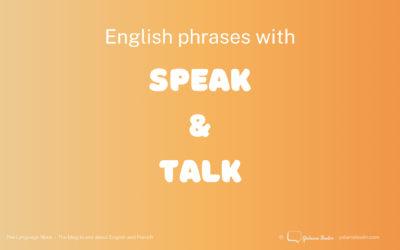English adjectives ending in -ed and in -ing are often confused. Many learners of English mix them up and use one for the other, for example boring for bored, interesting for interested, frightening for frightened, exciting for excited.
So, let’s look at what makes them different so you can be sure to use them correctly!
Adjectives that end in -ed describe emotions, the way you feel.
In the same way you can say you are sad or happy, you can also say that you are bored, interested or frightened or excited.
Adjectives that end in -ing describe something or someone that causes the emotion. For example, if you are bored during a film, it’s because the film is boring.
You use boring to describe the film that causes you to feel bored. You use bored to describe how you feel about that film.
Here are examples of English adjectives that can end in ed and in ing:
If something is… |
you feel… |
So, you can say: |
| boring | bored | This film is boring, so I’m bored. |
| interesting | Interested | I’m interested in this interesting book. |
| frightening | frightened | It was a frightening experience. He was frightened. |
| exciting | excited | I was excited to go to the funfair. The funfair was exciting. |
| annoying | annoyed | She was annoyed with him. He was annoying. |
| amazing | amazed | Wow, this is amazing! I’m amazed! |
| confusing | confused | These adjectives can be confusing. You are confused. |
| shocking | shocked | The news was shocking. We were all shocked. |
| tiring | tired | Our working day was tiring today. Are you tired, too? |
| disappointing | disappointed | It was so disappointing. I was very disappointed. |
Can you tell the difference? Test yourself with this little quiz:
Choose the correct answer:
There you are! I hope you were interested in this blog post. I hope you found it interesting and that you now feel confident about the difference between -ed and -ing adjectives! 😉





This post was very interesting, like all the others . I am really interested in your posts.
Thanks again Yolaine!
Thanks Marianne. I’m really pleased to hear that! 😉
Very simple yet effective explanation. Nothing complicated. Thanks Yolaine!
Thanks to you for your nice comment Ellen! 🙂
Very interesting again Yolaine , thank you
Thank you! Glad you like it! 🙂
Excellent!
I failed to mention that the explanation is so clear and I love the quiz. I got 15!
Fantastic! Well done and thank you for sharing your result of the quiz 🙂
This exercice was very interesting. I have got 13/15. Thank you Yolaine 🙂
Muriel
Well done Muriel! That is a great score
And thank you for sharing it! 😀